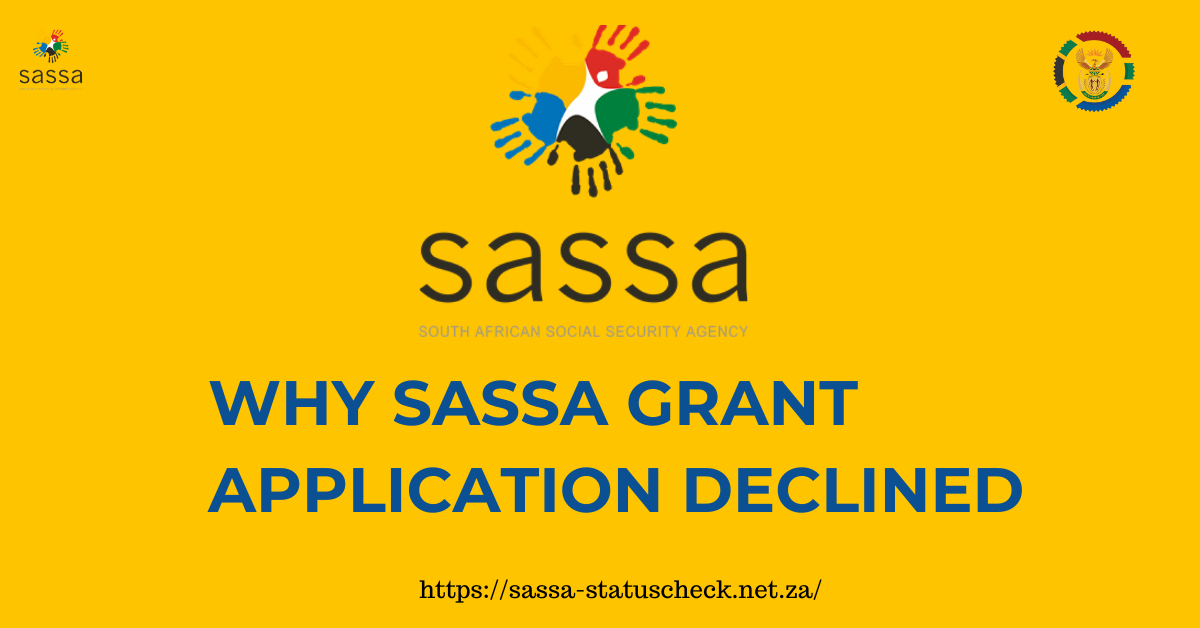The South African Social Security Agency (SASSA) plays a crucial role in providing social grants to eligible individuals, offering financial support to those in need. However, many applicants often face the disappointment of having their grant applications declined. This issue raises significant concerns and prompts a closer examination of the reasons behind such rejections.
Insufficient Documentation
One of the primary reasons for a SASSA grant application being declined is inadequate documentation. Applicants are required to provide thorough and accurate documentation to verify their eligibility. Missing or incomplete documents can lead to automatic rejection, as SASSA relies heavily on these documents to assess eligibility criteria.
Income Thresholds and Eligibility Criteria
SASSA grants are typically means-tested, meaning they are based on the applicant’s income and financial situation. If an applicant exceeds the income threshold or fails to meet other specific eligibility criteria, their application may be rejected. Understanding these criteria and ensuring compliance is essential to avoid unnecessary rejections.
Changes in Personal Circumstances
Changes in an applicant’s personal circumstances, such as changes in income or household composition, can impact eligibility for SASSA grants. Failure to update these changes or provide updated documentation can result in an application being declined. It is crucial for applicants to keep SASSA informed of any changes that may affect their eligibility.
Incorrect Information or Errors
Simple errors in the application process, such as providing incorrect personal information or filling out forms inaccurately, can lead to rejection. It is essential for applicants to double-check all information before submitting their applications to ensure accuracy and completeness.
Administrative Issues
Sometimes, SASSA grant applications are declined due to administrative errors or delays within the agency itself. These issues can range from processing delays to miscommunication, which may lead to applications being incorrectly marked as ineligible. Applicants facing such issues should follow up with SASSA to clarify and resolve any administrative errors promptly.
Appeal and Review Processes
For applicants whose SASSA grant applications have been declined, there are appeal and review processes available. It is crucial to understand these procedures and the necessary steps to appeal a decision. Providing additional documentation or clarifying information during the appeal process can sometimes overturn a rejection.
Alternate Income Source
SASSA carefully examines your financial situation and income sources. If you have a regular income exceeding R595 per month, including funds received through e-wallet accounts or cash-send services, your application may be declined
Existing SASSA Grant
SASSA guidelines state that individuals already receiving a social grant are not eligible for the R350 grant. This ensures fair distribution of resources among applicants.
Age Restrictions
The R350 grant is intended exclusively for people in the age range of 18 to 60. Those who apply outside of this age range might not be accepted because they don’t fit the requirements.
Fraudulent Activity
The SASSA has put safeguards in place to stop fraud and preserve the system’s integrity. Your application might be rejected if it is linked to fraudulent activity or if you are listed as a fraudster.
Employment and Income Tax Contributions
Your application may be rejected if SASSA discovers that you have worked and have paid income taxes.
Employment in a Government Institution
It’s possible that working for a government agency will disqualify you from the R350 grant or any other social grant. SASSA grants are only available to retired government employees, including older people and veterans of war. People who are currently employed will be turned down.
Deceased Status on Home Affairs Database
Your grant application may be denied if the Department of Home Affairs database has you listed as deceased. Strict measures have been put in place by SASSA against social grant recipients. Only in January 2024, 74,000 fraudulent accounts that were deceased were blocked by SASSA.
Conclusion
While the rejection of a SASSA Grant Application Declined can be disheartening, understanding the reasons behind it can help applicants take proactive steps to avoid or rectify issues in future applications. Ensuring thorough documentation, complying with eligibility criteria, and staying informed about personal circumstances are essential to improving the chances of a successful application. By addressing these factors, applicants can navigate the SASSA grant application process more effectively and access the financial support they need.

